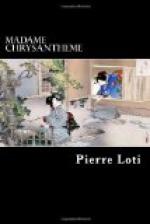Several mousmes execute, one after the other, improvizations on the chamecen. Others sing in sharp high voices hopping about continually, like cicalas in delirium.
Madame Prune, no longer able to make a mystery of the long-pent up feelings that agitate her, pays me the most marked and tender attentions, and begs my acceptance of a quantity of little souvenirs: an image, a little vase, a little porcelain goddess of the Moon in Satsuma ware, a marvelously grotesque ivory figure;—I tremblingly follow her into the dark corners whither she calls me to give me these presents in a tete-a-tete.
At about nine o’clock, with a silken rustling, arrive the three guechas in vogue in Nagasaki: Mdlles. Purete, Orange, and Printemps, whom I have hired at four dollars a head,—an enormous price in this country.
These three guechas are indeed the very same little creatures I heard singing on the rainy day of my arrival, through the thin paneling of the Garden of Flowers. But as I have now become thoroughly Japanized, to-day they appear to me more diminutive, less outlandish, and in no way mysterious. I treat them rather as dancers that I have hired, and the idea that I had ever thought of marrying one of them now makes me shrug my shoulders,—as it formerly did M. Kangourou.
The excessive heat caused by the respiration of the mousmes and the burning lamps, brings out the perfume of the lotus, which fills the heavy-laden atmosphere; and the scent of the camelia-oil the ladies use in profusion to make their hair glisten, is also strong in the room.
Mdlle. Orange, the youngest guecha, tiny and dainty, her lips outlined with gilt paint, executes some delightful steps, donning the most extraordinary wigs and masks in wood or cardboard. She has masks imitating old noble ladies which are valuable works of art, signed by well-known artists. She has also magnificent long robes, fashioned in the old style, and trains trimmed at the bottom with thick pads, in order to give to the movements of the costume something rigid and unnatural which, however, is becoming.
Now the soft balmy breezes blow through the room, from one verandah to the other, making the flames of the lamps flicker. They scatter the lotus flowers faded by the artificial heat, which, falling in pieces from every vase, sprinkle the guests with their pollen and large pink petals, looking like bits of broken opal-colored glass.
The sensational piece, reserved for the end, is a trio on the chamecen, long and monotonous, that the guechas perform as a rapid pizzicato on the highest strings, very sharply struck. It sounds like the very quintescence, the paraphrase, the exasperation if I may so call it, of the eternal buzz of insects, which issues from the trees, old roofs, old walls, from everything in fact, and which is the ground-work of all Japanese sounds.
Half-past ten! The program has been carried out, and the reception is over. A last general pan! pan! pan! the little pipes are stowed away into their chased sheaths, tied up in the sashes, and the mousmes rise to depart.




